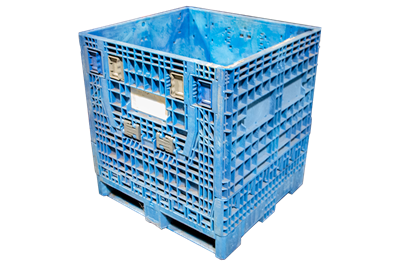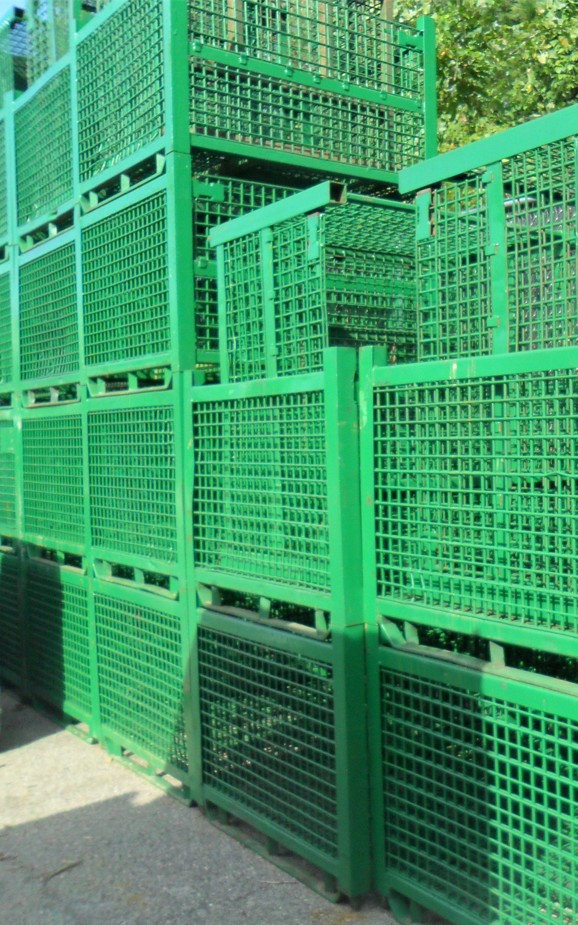The Ultimate Overview to Choosing the Right Mass Containers for Your Company Demands
Choosing the suitable mass containers is vital for any company that relies upon effective logistics. Different kinds of containers exist, each created for details products and applications. Variables such as dimension, product compatibility, and regulative standards play a substantial role in this decision-making process. Understanding these aspects can cause boosted functional effectiveness. Nonetheless, several services ignore essential elements that might boost their overall efficiency and sustainability. What are these factors to consider?
Understanding Various Sorts Of Bulk Containers
Mass containers work as essential tools for services seeking reliable storage and transportation services. These containers come in different kinds, each made to satisfy details functional needs. One typical type is the intermediate mass container (IBC), which is suitable for liquid and granulated materials, providing a balance of capacity and maneuverability. One more prominent alternative is the mass bag, or FIBC, suitable for completely dry, flowable items. These flexible containers are lightweight and can be easily transferred and kept. For larger products, rigid bulk containers are frequently employed, providing resilience and security for risk-free handling. Furthermore, there are customized containers tailored for unsafe products, making certain compliance with safety regulations. Comprehending the unique qualities of these mass container types permits organizations to make informed choices that optimize logistics and lower prices. By selecting the right container, firms can enhance their operational performance and enhance their supply chain processes.
Key Material Considerations for Bulk Containers
When choosing mass containers, it is important to ponder the materials utilized in their construction. Aspects such as stamina, chemical, and sturdiness compatibility play a crucial duty in making sure the containers satisfy specific functional demands. In addition, weight and transportability concerns can affect both performance and transportation logistics.
Material Toughness and Stamina
Sturdiness and toughness are important consider picking products for mass containers, as they directly influence the container's ability to endure various ecological conditions and handling processes. Products such as high-density polyethylene (HDPE), polypropylene, and stainless-steel are typically favored for their robust properties, providing resistance to impact, temperature level, and abrasion fluctuations. The option of material additionally impacts the overall life expectancy of the container; stronger products normally cause much less regular replacements, leading to set you back savings gradually. Furthermore, the weight of the material can influence delivery costs and ease of handling. Companies need to consider their particular functional atmospheres and the potential for wear and tear to ensure peak resilience and strength in their mass container selection.
Chemical Compatibility Factors
Recognizing chemical compatibility is crucial for picking bulk containers, as the products made use of need to withstand the specific materials they will hold. Different elements affect compatibility, consisting of the chemical nature of the components, temperature, and duration of storage. Destructive chemicals might require containers made from stainless steel or specialized plastics that withstand destruction. Furthermore, responsive materials can generate warmth or gases, demanding aired vent or pressure-rated containers. The choice of container product, whether polycarbonate, polyethylene, or steel, should line up with the chemical homes of the saved materials to avoid leaks or violations. Inevitably, a detailed assessment of these compatibility aspects ensures secure handling and storage, shielding both workers and the atmosphere while keeping item honesty.
Weight and Mobility Problems
Choosing mass containers entails not just assessing chemical compatibility however additionally thinking about weight and portability. Services must examine the convenience of handling and transport to enhance effectiveness. Lightweight products like high-density polyethylene (HDPE) or aluminum can help with easier activity and decrease shipping costs. Alternatively, much heavier containers may give enhanced longevity but can impede flexibility, specifically in environments needing constant relocation. Furthermore, the style of the container need to permit convenient lifting and stacking, guaranteeing ergonomic safety for workers. Business need to additionally consider the infrastructure readily available for transport; for example, containers compatible with forklifts or pallet jacks can streamline operations. Eventually, the best balance between weight and mobility directly affects functional efficiency and expense efficiency.
Sizing Your Mass Containers for Ideal Efficiency
When sizing mass containers, services should carefully examine the dimensions required to suit their specific items. Furthermore, weight capacity is an essential aspect that affects performance and safety and security throughout transportation and storage. Efficient sizing not only optimizes area but likewise enhances operational workflows.
Determining Container Capacities
Choosing the appropriate measurements for bulk containers is important for taking full advantage of effectiveness in storage and transport. Organizations must analyze their certain demands, considering aspects such as available room, the nature of the items being saved, and the methods of transport made use of. Exact dimensions ensure that containers fit ideally in stockrooms and lorries, decreasing wasted room and lowering taking care of time. Standard sizes can provide ease, yet custom-made dimensions could be necessary for distinct requirements or to suit particular items. Additionally, it is very important to evaluate piling abilities and availability, as these variables influence overall operational efficiency. Eventually, the appropriate measurements lead to enhanced company and streamlined logistics, profiting the overall productivity of the organization.
Weight Capacity Considerations
Comprehending weight capacity is important for organizations aiming to enhance their mass container effectiveness. The weight capacity of a container directly affects storage abilities, transport logistics, and overall functional costs. Selecting containers with the suitable weight limitations assures that organizations can safely keep and carry their goods without running the risk of damage or compliance problems. Overwhelming containers can result in architectural failings, while underutilizing capacity cause wasted resources. It is necessary for companies to examine their product weights and consider any kind of regulatory requirements when picking containers. In addition, variables such as the sort of material, planned use, and environmental conditions should also affect weight capability decisions. By reviewing these elements, organizations can improve efficiency and guarantee a structured supply chain.
Regulatory Compliance and Safety And Security Standards

Regulatory conformity and safety and security standards play a crucial role in the option of bulk containers for organizations. Organizations should guarantee that their containers meet numerous guidelines established by regional, nationwide, and worldwide authorities. These standards often relate to product safety, structural integrity, and appropriate labeling, which aid protect against mishaps and assure the risk-free transportation of items.
Furthermore, adherence to industry-specific standards, such as those from the Food and Medicine Management (FDA) or the Occupational Security and Health And Wellness Administration (OSHA), is crucial for firms taking care of harmful products or food items. Non-compliance can lead to penalties, legal problems, or damage to an organization's online reputation.
Services should also consider the container's compatibility with the products being stored or carried to avoid contamination or chain reaction (refurbished bulk containers). To sum up, comprehending and executing governing compliance and safety requirements is crucial for the liable and efficient use mass containers
Sustainability Choices for Eco-Friendly Bulk Containers

Firms are additionally checking out alternatives made from recycled products, which not just preserve sources however likewise support the reusing market. In addition, advancements in style permit lighter containers that call for less power to transport, further boosting sustainability. By incorporating these green mass container alternatives, businesses can demonstrate their commitment to ecological stewardship while satisfying consumer demand for sustainable methods. This shift not just helps the planet yet can likewise enhance brand name reputation and client loyalty.
Cost-Effectiveness and Budgeting for Bulk Containers
While many services focus on sustainability, cost-effectiveness stays a vital variable read more when selecting mass containers. Organizations should examine the first purchase price, in addition to lasting operational prices, to ensure monetary viability. Factors such as toughness, reusability, and upkeep play a considerable function in identifying overall expenditures.
Purchasing high-grade containers might produce greater upfront costs however can lead to financial savings through reduced replacement prices and lowered waste. Furthermore, companies must take into consideration transport expenses and storage effectiveness, as these can affect the overall spending plan.

Often Asked Inquiries
How Do I Determine the Right Container for Hazardous Materials?
To identify the ideal container for harmful products, one should assess compatibility with the substance, consider the container's material, check for regulative conformity, and assess ability and safety features to guarantee proper handling and storage space.
Can Mass Containers Be Personalized for Specific Products?
Yes, bulk containers can be tailored for certain items. used collapsible bulk containers. Numerous functions, such as style, product, and dimension, can be customized to meet one-of-a-kind demands, making sure optimal safety and security and performance for delivering and saving various goods
What Is the Typical Lifespan of Various Bulk Container Kind?
The average life expectancy of bulk container types differs; plastic containers last 5-10 years, metal containers 10-20 years, and wooden containers usually last 3-7 years, relying on use, maintenance, and ecological conditions.
How Should I Clean and Maintain Mass Containers?
To cleanse and preserve bulk containers, one should regularly examine for damages, eliminate deposit, laundry with suitable cleaning agents, rinse thoroughly, and warranty appropriate drying out prior to storage. Complying with supplier guidelines enhances durability and safety and security during use.
Exist Rental Choices for Mass Containers Available?
Yes, many companies provide rental choices for mass containers, providing adaptability for organizations. These leasings can fit different demands, permitting business to take care of inventory efficiently without the commitment of purchasing containers outright.
Sturdiness and toughness are crucial variables in selecting materials for bulk containers, as they straight affect the container's ability to withstand different ecological problems and managing procedures. Recognizing chemical compatibility is important for choosing mass containers, as the products utilized need to stand up to the specific compounds they will certainly hold. Comprehending weight capability is essential for services intending to enhance their mass container performance. Regulatory compliance and safety and security requirements play an essential function in the selection of bulk containers for businesses. While many businesses focus on sustainability, cost-effectiveness remains a crucial element when picking bulk containers.